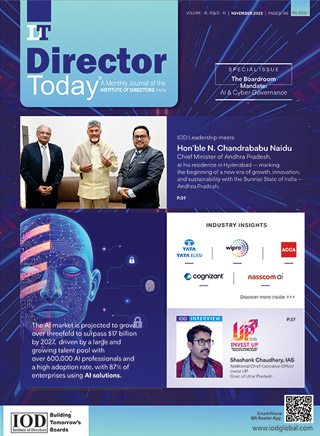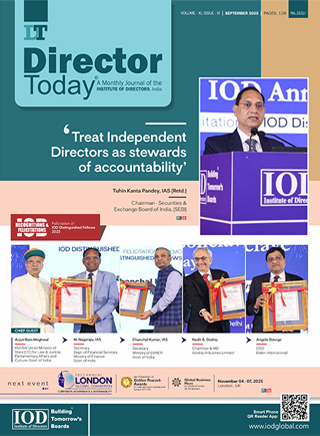Special Message from - Chairman, IOD Hyderabad Region

In today’s evolving corporate landscape, the convergence of compliance, audit, risk, and digital functions within corporate governance has become essential. Traditional compartmentalization of these functions no longer seems sufficient, as the complexity of modern business environments demands a more integrated approach. Boards must adeptly navigate the increasingly complex compliance discussions within the boardroom due to the evolving national and global regulatory landscape.
An increasing premium on the ability of the Board to address ethical and integrity challenges is evident, driven by investor activism, regulatory pressures, and stakeholder expectations. This evolving scrutiny underscores the increasingly important role the board plays in ensuring audit independence and addressing audit findings, which are critical for maintaining transparency and accountability.
Decisions related to digital transformation, data privacy, and cybersecurity are now at the forefront, requiring a nuanced understanding of digital trends and the associated risks. As the digital landscape's continual evolution progresses, boards must adapt their strategies to keep pace with these changes.
Moreover, diverse perspectives within corporate boards are essential for effective decision-making and risk mitigation. Companies must prioritise board composition that reflects a broad spectrum of expertise, backgrounds, and viewpoints, as this diversity enhances innovation, decision-making effectiveness, and reflects a commitment to equity and social responsibility. Effective governance requires that boards integrate these diverse perspectives to drive comprehensive and balanced decision-making processes.
In addition to these trends, the board’s role in making financial controls 'board-friendly' to ensure understanding and effective implementation cannot be overlooked. Boards must shape company strategy with a clear understanding of both external and internal risks. Boards often overestimate outside risks while underestimating internal ones, making it vital to structure boards for smart risk oversight.
The role of independent directors is pivotal, as they must ensure accountability, particularly in aligning executive pay with company performance and maintaining financial integrity. Despite potential gaps in expertise, independent directors are held responsible for their duties, necessitating proactive engagement and due diligence.
Finally, boards must enhance their crisis preparedness and response strategies to mitigate risks and safeguard shareholder value. This includes strengthening ESG integration into governance practices and ensuring robust whistle-blower protections to promote transparency and accountability.
Author

Institute of Directors India
Bringing a Silent Revolution through the Boardroom
Institute of Directors (IOD) is an apex national association of Corporate Directors under the India's 'Societies Registration Act XXI of 1860'. Currently it is associated with over 31,000 senior executives from Govt, PSU and Private organizations of India and abroad.
Owned by: Institute of Directors, India
Disclaimer: The opinions expressed in the articles/ stories are the personal opinions of the author. IOD/ Editor is not responsible for the accuracy, completeness, suitability, or validity of any information in those articles. The information, facts or opinions expressed in the articles/ speeches do not reflect the views of IOD/ Editor and IOD/ Editor does not assume any responsibility or liability for the same.

 Quick Links
Quick Links
 Connect us
Connect us




 Back to Home
Back to Home






























